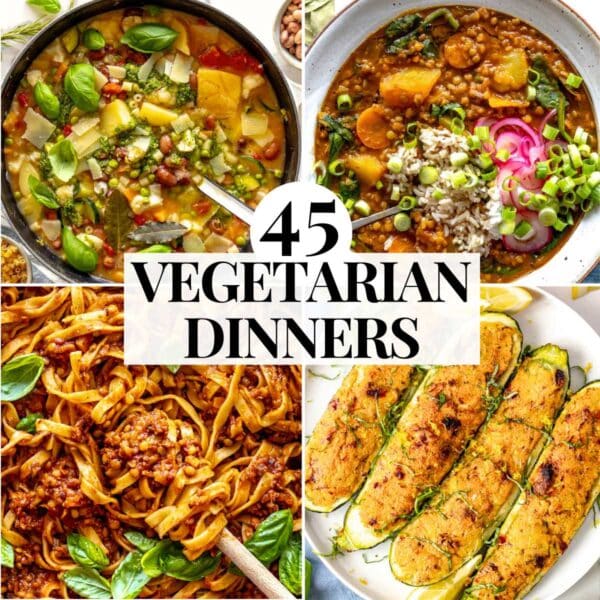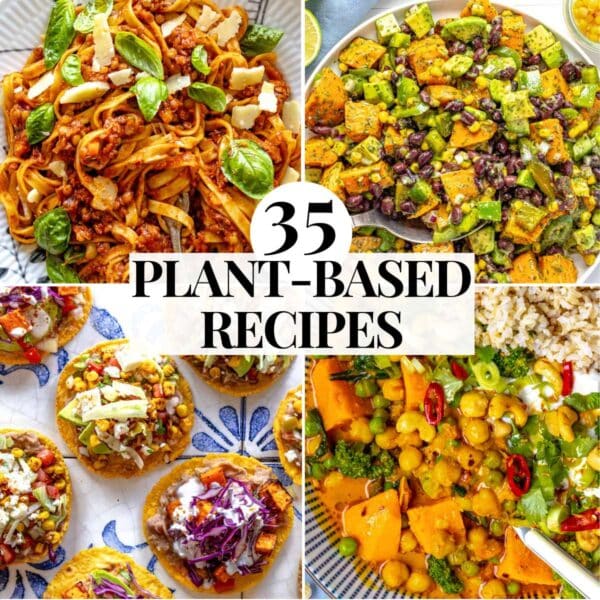Vegetables, peas, chickpeas and coconut milk simmer in a flavor base of garlic, onion, and spices until tender and flavorful. While the ingredient list can seem daunting initially, the recipe is easy to follow, and you can reuse the same leftover spices in most of our easy and healthy recipes. And based on your feedback, you guys love them, too. Our lentil curry and chickpea curry are some of our most popular posts. When you learn the basic steps to making a great curry, you can easily make most of them, from potato curry to cauliflower curry, from sweet potato curry to eggplant curry. In this vegetable curry, we use chickpeas and frozen peas for protein and broccoli, sweet potato, and spinach for flavor and nutrition. But you can use most vegetables, so feel free to swap ours for what you have available at home. Also, you will love this recipe even if you are not a coconut milk lover. It’s perfectly balanced, creamy, mildly sweet, and aromatic. Most importantly, it is an easy and satisfying dinner for the whole family.
Flavor base
Olive oil: we recommend olive oil or extra virgin olive oil. You can substitute coconut oil, avocado oil, or another vegetable oil for olive oil. Onion: you can use white, red, yellow onion or shallots. Garlic: fresh garlic, grated. Substitute garlic paste. Ginger: fresh ginger, grated. Substitute ginger paste.
Spices
Remember that spice intensity varies based on the brand of your spices and how long you have kept them in your pantry. Start with our quantities, then taste and adjust your vegetable curry with more spices if you want a bolder flavor. We use:
Curry powder Turmeric powder Ground coriander Ground cumin Red pepper flakes Black pepper Salt Garam masala (added at the end, shortly before serving the curry)
Optionally, add cardamom, mustard seeds, curry leaves, and cinnamon.
Vegetables
You can use fresh or frozen vegetables and mix and match them based on your preference. A tip is to cut the veggies into bite-size pieces so they all cook simultaneously. Also, add sturdier veggies before softer veggies. We use:
Sweet potato: substitute potatoes, eggplant, carrots, butternut squash, pumpkin, kabocha squash, or other orange-fleshed squashes. Broccoli: substitute cauliflower, cabbage, red bell pepper, or mushrooms. Chickpeas: you can use canned or dried chickpeas that you previously cooked in water. Here’s our guide on how to cook dried chickpeas. Peas: substitute snap peas, green beans, or black beans. Spinach: substitute kale, bok choi, or Swiss chard.
Liquids
Coconut milk: you can use full-fat or light coconut milk. Vegetable broth: you can use reduced-sodium vegetable broth or substitute water. Canned tomatoes: use diced or crushed tomatoes. Substitute with ripe fresh tomatoes, chopped into small dice.
Serve it with
Fresh herbs: we recommend cilantro (fresh coriander), spring onions, or fresh parsley. Lime: squeeze some fresh lime juice on top before serving. Substitute fresh lemon juice. Rice: steamed or boiled basmati, jasmine, or whole grain rice. Substitute warm naan bread. Yogurt: top with a dollop of plain, greek, or non-dairy yogurt. Tadka + cashews: You can make a delicious tadka, which is a flavored oil, and drizzle it on top. You can also toast some cashews in the tadka for a nice crunch.
Add the chopped onion and sauté on medium heat for 3 minutes, stirring often. Add grated garlic and ginger, curry powder, turmeric powder, ground cumin, coriander, red pepper flakes, salt, and black pepper. Stir and toast the spices for one minute until you smell their fragrant aroma. If the pan gets dry, add two tablespoons of water and stir until a paste forms. Tip: Remember to cook the rice so it’s ready with the curry! Brown rice takes about 30 minutes, and white rice takes about 10 to 12 minutes. Add vegetable broth, coconut milk, canned tomatoes, drained chickpeas, peeled and diced sweet potatoes. Stir, cover, and simmer for 10 minutes. Add broccoli florets and frozen peas and simmer uncovered for 15 to 20 minutes or until the sweet potatoes are fork tender. Stir occasionally. Turn the heat off and stir in the spinach and garam masala, then taste and adjust for salt before serving.
How to serve vegetable curry
For a delicious dinner, serve this vegetable curry in a bowl with cooked basmati rice or brown whole-grain rice. You can substitute naan or roti for rice. Also, toppings are so important! We recommend a dollop of Greek yogurt or sour cream, a squeeze of lime or lemon, chopped cilantro or spring onions, toasted cashews, and a drizzle of tadka. Tip: Tadka is an Indian flavored oil you can make while the curry cooks by toasting spices and chili in oil. Here’s our tadka recipe. Refrigerator: Keep leftovers in an airtight container for four days. Freezer: Let the curry cool down completely, then transfer it to a freezer-friendly container and freeze for up to 3 months. Thaw: Defrost it in the fridge over several hours, or pop it in the microwave for a few minutes. Reheat: Thaw in the microwave or a saucepan on the stove. If it is too dense, add a splash of water.
Similar recipes
CREAMY CURRIES: Chana saag (chickpea spinach curry), pumpkin curry, tofu curry, vegan curry, aloo gobi. HEARTY STEWS: Chickpea stew, chana masala, mung bean soup, vegetable stew, chana dal, curry lentil soup.
Chana Masala
Chickpea Stew
Curry Lentil Soup
Lentil Curry
45 Easy Vegetarian Dinner Recipes
30 High Protein Vegetarian Meals
35 Potluck Ideas
35 Plant-based Recipes



















